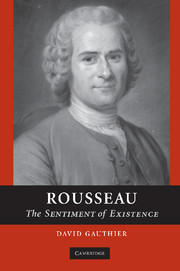5 - Making Jean-Jacques
Published online by Cambridge University Press: 29 March 2010
Summary
“Let the trumpet of the last judgement sound when it will; I shall come with this book in my hands to present myself before the Sovereign Judge.” (CW5.5, OC1.5) “This book” is of course the Confessions. “I shall say loudly, ‘Behold what I have done, what I have thought, what I have been.’” And if there is a gap in memory, “I may have assumed to be true what I knew might have been so, never what I knew to be false.” So in the Confessions, Rousseau presents himself for judgment. And not only by the sovereign judge, for he demands, “Eternal Being, assemble around me the countless host of my fellows: let them listen to my confessions, let them shudder at my unworthiness, let them blush at my woes … and then let a single one say to Thee, if he dares: ‘I was better than that man.’” (Ibid.)
But the Confessions does more than present Rousseau for judgment. In the note found in the Geneva manuscript of the Confessions, he announces, “Here is the only portrait of a man, painted exactly according to nature and in all its truth, that exists and that will probably ever exist.” (CW5.3, OC1.3) He pleads with whoever decides its fate, “not to destroy a unique and useful work, a study which can serve as the first comparative base for the study of men, which certainly has not yet begun.”
- Type
- Chapter
- Information
- RousseauThe Sentiment of Existence, pp. 107 - 137Publisher: Cambridge University PressPrint publication year: 2006



